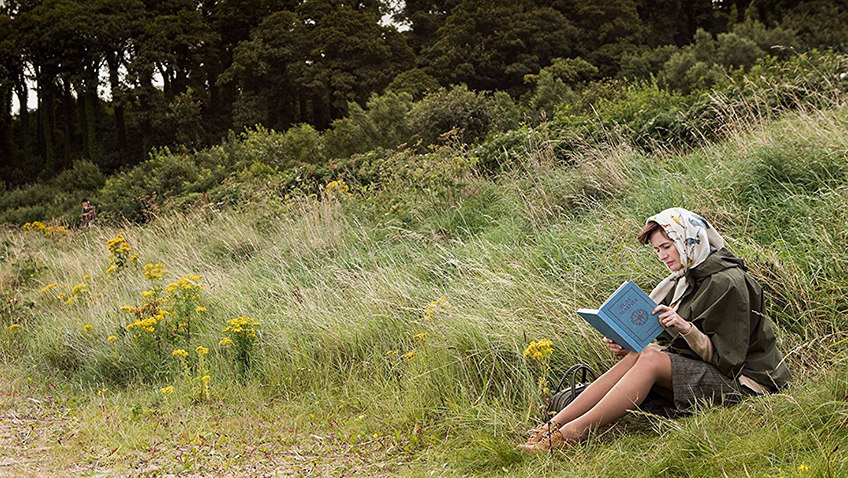Joyce Glasser reviews The Bookshop (June 29, 2018) Cert. PG, 113 min.
Independent bookshop owners valiantly holding their own against the onslaught of Amazon and the consolidation of the remaining chains will find a kindred spirit in Florence Green, who opens the sleepy, picturesque Suffolk coast town of Harborough’s first bookshop in 1957. There is no competition from nearby outlets or the distant internet, but as anyone familiar with Penelope Fitzgerald’s 1978 novel knows, obstacles to entrepreneurship come from unlikely and myriad sources.
 Barcelona born writer/director Isabel Coixet’s (Learning to Drive, Elegy) adaptation does a good job in capturing the characters and the growing salt-aired mould attacking Florence’s vision, but fails to find a way to dramatise a novel that is hardly a page-turner to begin with.
Barcelona born writer/director Isabel Coixet’s (Learning to Drive, Elegy) adaptation does a good job in capturing the characters and the growing salt-aired mould attacking Florence’s vision, but fails to find a way to dramatise a novel that is hardly a page-turner to begin with.
Middle-aged, widowed Florence Green (Emily Mortimer) has made a courageous decision to invest all of the money she has in a labour of love, convinced that the townsfolk will realise that they need a bookshop as much as she thinks they do. She has purchased The Old House, a damp, derelict cottage that has enough room – and quaintness of character – to use as living accommodation and as a bookshop.
Bank managers and lawyers are petty minded and unhelpful little men, but Florence finds mild encouragement from other quarters. And when she is invited to politically connected Violet Gamart’s (a purse lipped, uptight Patricia Clarkson) mansion for a cocktail party, Florence dares to hope that it is in recognition of her future contribution to the town with her bookshop.
It is at the party, however, that the battle lines are being drawn without Florence’s knowledge. She meets a lazy, but intelligent BBC executive named Milo North (James Lance). He comes across as friendly and interested in Florence’s welfare, but proves to be a slippery weasel. Florence does not meet a politician who shortly after hearing about the bookshop from his aunt Violet begins drafting an Act of Parliament to preserve heritage buildings for public use. When Florence finally chats with her hostess, whose attire is as stiff as its owner, she learns that there is sudden interest in turning the building into an arts centre – and newfound money to do so.
It is those who will never be invited to, or willingly step foot into the Gamart’s grand house, however, who provide comfort and encouragement to Florence. Wally (Harvey Bennett), a young boy scout does odd jobs, and ten-year-old Christine (Honor Kneafsey) who does not like reading, but whose family needs the money, works for Florence after school. Encouragement comes from an unexpected place when a respected, though long-reclusive member of the town’s old guard, Mr Edmund Brundish (Bill Nighy) sends Florence a letter welcoming her enterprise.
It is two-faced Milo North who tells Florence that if she wants to make money she should order Nabokov’s Lolita, a novel that is already famous and needs no advertising. More interested in good books than money, she sends the book to Mr Brundish for his verdict, although we are never sure why a bookshop owner so fond of words and books would feel unable to make a decision on its quality. Nor for that matter is it clear why Florence would not have heard of the book, published in 1955, as (in the novel at least) she reads the book trade papers. As for Brundish, he is a Ray Bradbury fan and orders Bradbury’s latest novel (published in 1957) Dandelion Wine
, a book about the joyful routines of small town America.
The routines of small town Sussex are less joyful. In both the novel and the film, we hope that the sluggish pace will pick up when Lolita goes on sale, but though the new arrival attracts complaints over gawking crowds, Florence’s brave acquisition changes nothing. In time, the fortunes of Florence’s bookshop go steadily downhill with the opening of another bookshop (Mrs Gamart’s doing) nearby.
The relationship between Brundish and Florence is one based on mutual respect and an appreciation of literature, but Coixet adds a scene to bring out the latent romance. Fitzgerald purists might disagree, but most of us will wish that there were more scenes with this charming gentleman and beleaguered, lonely widow together.
Coixet delivers such a faithful adaptation that there is a high degree of cutting and pasting dialogue from the novel to the script. This is not a bad thing when you are pasting Fitzgerald’s acerbic, cynical or subtly brutal lines, but Coixet shies away from the groundswell of darkness that envelops the novel by giving the story an uplifting ending. This uncharacteristically sentimental turn – rendered even more so by composer Alfonso de Vilallonga’s overbearing strings – involves turning Christine (Coixet has left out the part about her failing her 11+ exams, and not going to a grammar school) into something she isn’t.
So attached is Coixet to the novel, that she introduces a mysterious narrator (the lovely voice is that of Julie Christie) who occasionally breaks the fourth wall to annoyingly tell us what a more confident director would show us. Fortunately, though she dispenses with the haunted nature of The Old House.
Brundish declares how much he admires Florence’s courage, and others comment on her uncommon kindness and generosity, which Mortimer has no trouble conveying. Perhaps it is the medium of film or the progress women in business have made since the 1950s, but in the film, Florence’s passive acceptance of her fate coupled with her extreme naivety begins to irk.
Florence’s gentle nature is one thing, but the gentle nature of the film is more of a problem, particularly as the episodic structure of the first half of the novel is magnified in film. Coixet might get away with using the rugged Irish coast for 1950’s Sussex, but she needs the audience sufficiently awake to soak in the atmosphere.
You can watch the film trailer here:






